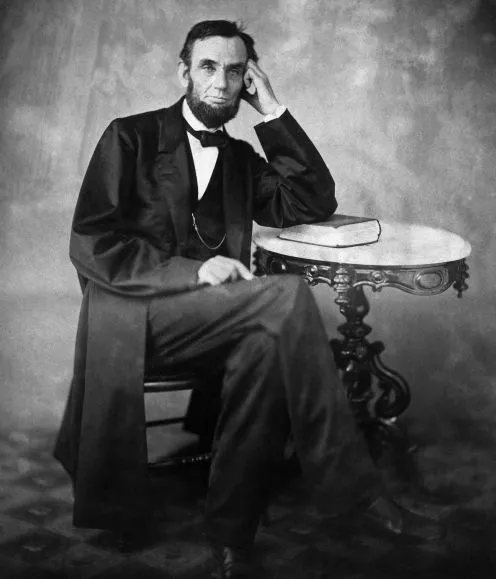
Today’s Leader of Faith
ABRAHAM LINCOLN
Home Call : 15 April 1865
The greatest president, Theologian, and Abolitionist in American history. A great hero who sacrificed his life fighting for truth, justice, and equality.
Abraham Lincoln (1809–1865), the renowned President of the United States, is known across the world as the greatest president to have ever served. The hardships he faced in childhood shaped him into a man of strength and wisdom. His humble family background gave him a deep sense of compassion, self-confidence, and commitment, the qualities that moulded him into a great leader. Born into a poor and ordinary household, it was through education, hard work, and unwavering determination that he rose to the presidency. This journey helped him understand the struggles of the common people and empowered him to uphold justice for all. He fought for human rights, equality, and justice. Defending democracy, he led the nation through the Civil War. During this turbulent time, he stood as a towering leader who held the country together. He played a pivotal role in abolishing slavery, earning him lasting honor and recognition. Although he was sceptical and read deist writers, over time, especially through the trials of the Civil War and the personal sorrow of losing his children, his dependence on God deepened. He often quoted the Bible in his public speeches, speaking of God’s ways with reverence and conviction. Later, his theological outlook became especially noteworthy. He acknowledged God’s justice and the nation’s need for repentance. Lincoln believed that the Civil War was a divine judgment upon the sin of slavery. As his faith matured into a genuine and humble trust in God, he came to view his role as President in light of God’s higher purposes. His faith was not traditional or institutional, but deeply personal, reverent, and central to his moral vision and leadership. In 1863, he established Thanksgiving Day as a national holiday. During the Civil War, he urged Americans to express gratitude for God’s blessings and to pray for healing and unity. In his famous Gettysburg Address, he powerfully affirmed his faith in a government “of the people, by the people, for the people,” standing firmly for democracy. This vision of democracy later inspired many nations across the world and helped shape the foundations of modern democratic governance. After the Civil War, Lincoln abolished slavery, leaving a lasting legacy of justice and freedom. Before he could carry forward efforts to secure voting rights for African Americans, Abraham Lincoln was tragically assassinated by his opponents. As a result, it took nearly a century, and the struggle led by Martin Luther King Jr., for Black Americans to gain effective voting rights. The Lincoln Bible, which he used during his first presidential inauguration in 1861, was later used by U.S. Presidents Barack Obama and Donald Trump during their own inaugurations as a tribute to Lincoln’s legacy. Lincoln regularly attended services at the New York Avenue Presbyterian Church in Washington, D.C.
Lincoln was born on February 12, 1809, in a log cabin in Kentucky to Thomas and Nancy Lincoln. His family was of English descent and had settled in America generations earlier. In 1816, his father, Thomas, moved the family to Indiana, a free state. The family belonged to a Baptist congregation. Lincoln was largely self-educated, gaining knowledge through personal effort, reading the Bible and other classic works. As a young man, he worked various jobs, developing strength through physical labour and excelling in wrestling. In 1830, he moved to Illinois, where his love for learning created a distance between him and his father. Eventually, he settled in New Salem, where he ran a store. After experiencing failure in business, he studied law independently and became a practicing lawyer. Later, he entered politics, rising step by step with integrity, ultimately reaching the highest office in the nation.
Abraham Lincoln became the 16th President of the United States on March 4, 1861. During his presidency, he faced the secession of the Southern states, which led to the Civil War just weeks after his inauguration. He took strong steps to preserve the Union, including raising an army and leading the North through the war. In 1863, he issued the Emancipation Proclamation, declaring that all enslaved people in Confederate states were free. He promoted the 13th Amendment, which permanently abolished slavery in the United States. He also strengthened the federal government and laid the foundation for Reconstruction.
Lincoln was assassinated on the night of April 14, 1865, just days after the end of the Civil War. He was attending a play titled ‘Our American Cousin’ at Ford’s Theatre in Washington, D.C., when he was shot in the back of the head by John Wilkes Booth, a Confederate sympathizer. He was carried across the street to the Petersen House, where he lay unconscious through the night. He died the next morning, on April 15, 1865, at 7:22 a.m., becoming the first U.S. president to be assassinated. His death shocked the nation and plunged it into deep mourning. He was honored as a martyr for liberty and unity, and his funeral procession drew massive crowds across several cities. Many monuments and memorials have been built in honor of Abraham Lincoln, both in the United States and around the world. Lincoln’s moral values were honesty, equality, compassion, leadership, patience, and courage. Shouldn’t today’s leaders strive to follow such values?
— John Michael, Rajahmundry
